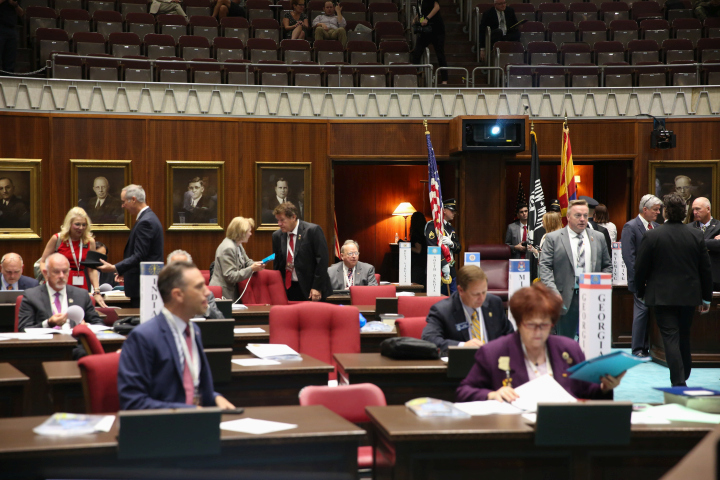
States in Convention, Phoenix 2017
By Senator Steve Halloran-NE – February 14, 2024
Americans have grown anxious regarding the wild, uncontrolled federal spending which has resulted in an unsustainable national debt. Year after year, Congress has demonstrated its unwillingness to pass a balanced federal budget. Our national debt has ballooned to more than $34 trillion.
Our national debt is 122.73% of our country’s gross domestic product. In other words, this debt exceeds the annual value of all of the goods and services produced in our country. This is unsustainable and threatens the very financial stability of our country.
In a recent editorial Gavin Geis displayed his complete misunderstanding of and misinterpretation of the clear and concise language in Article V of our U.S. Constitution. For the sake of bringing factual information to the public, I quote the Founding Framers’ language in Article V.
“The Congress, whenever two thirds of both Houses shall deem it necessary, shall propose amendments to this Constitution, or, on the Application of the Legislatures of two thirds of the several States, shall call a Convention for proposing Amendments, which, in either Case, shall be valid to all Intents and Purposes, as Part of this Constitution, when ratified by the Legislatures of three fourths of the several States, or by conventions in three fourths thereof, as the one or the other Mode of Ratification may be proposed by the Congress; Provided that no Amendment which may be made prior to the Year One thousand eight hundred and eight shall in any Manner affect the first and fourth Clauses in the Ninth Section of the first Article; and that no state, without its Consent, shall be deprived of its equal Suffrage in the Senate.”
Article V clearly defines two methods for “proposing” amendments to the Constitution — one by Congress and the second method by calling for a “Convention of States,” both subject to ratification by three-fourths of the states.
Mr. Geis seems to be misleading the public by falsely claiming that Article V authorizes a “Constitutional Convention” for the purpose of writing a new Constitution.
The language in Article V does not authorize Congress or a Convention of States to engage in a “Constitutional Convention.” Mr. Geis is engaged in creating fear, uncertainty and doubt through his misinterpretation of Article V of our Constitution.
On Jan. 28, 2022, I sponsored LR14, by which the Legislature of the State of Nebraska applied to Congress, under the provisions of Article V of the Constitution of the United States, for the calling of a Convention of the States limited to proposing amendments to the Constitution of the United States that 1) impose fiscal restraints on the federal government, 2) limit the power and jurisdiction of the federal government, and 3) limit the terms of office for its officials and for members of Congress.
In order to attain the necessary one vote to end a filibuster, I settled on accepting a five-year sunset clause, which would have rescinded this resolution in five years.
I was not optimistic that Congress would either adopt a balanced budget or take actions to reduce the national debt. If Congress would have demonstrated some level of responsible fiscal policy since the passage of LR14, then I would have to agree that the Article V call for a Convention of States to propose amendments to require Congress to restrain spending would not be necessary.
In fact, on the date we passed this resolution the national debt was $29.9 trillion. Today our country’s debt stands at $34.2 trillion. In two short years the debt has increased by $4.3 trillion. This is totally unacceptable.
This is the reason I reintroduced this Article V Resolution. Congress will not take action to restrain spending.
Either Mr. Geis does not understand our Constitution or he is purposefully misrepresenting it.
(Editor: for a glimpse at how an Article V convention of states operates utilizing the SOP used in 1787 and 2017, click on this 5 minute video, States in Convention.)
